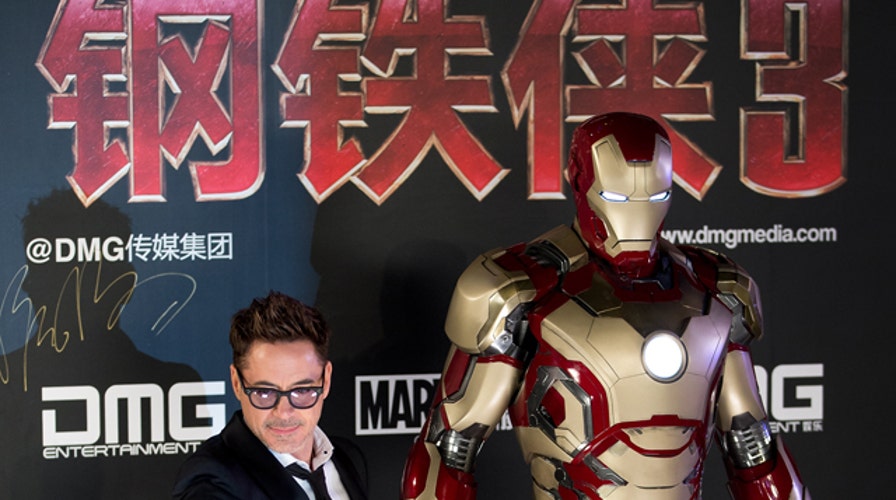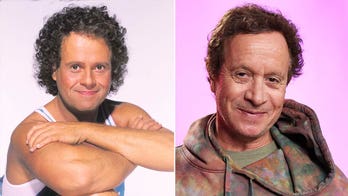China's increasing influence in Hollywood
Find out the reason why there is a new push to please Chinese movie market
LOS ANGELES – The big-budget Hollywood blockbuster that unofficially launches the summer movie season, “Iron Man 3,” opens in the U.S. on May 3. The film premieres the same day in China, and it turns out the Chinese viewing audience received significant attention during the filmmaking process.
Partly financed by the Chinese studio DMG in addition to Hollywood’s Marvel Studios, "Iron Man 3" includes a number of scenes filmed on location in the People’s Republic. According to Marvel Studios, the Chinese edition also includes “significant Chinese elements” including special bonus footage and an appearance by their top actress, Fan Bingbing.
“Iron Man 3” has a huge tie-in with leading Chinese tech brand TCL as well, providing screen time for the company’s flat screen TVs, cloud computing technology, and Smartphone brand. In addition, TCL recently forked out $5 million for the naming rights to Hollywood’s iconic Grauman’s Chinese Theater, so now the film will feature a scene that annihilates the new “TCL Chinese Theater.”
According to multiple reports, the scene appears to have been shot and added following the naming rights announcement in January.
Even the film’s leading man is involved in China outreach. During a promotional trip there earlier this month, Robert Downey Jr., who reprises his role as Tony Stark, excited the crowd by expressing his fascination with Chinese culture and love for Chinese films, while encouraging fans to flock to his superhero movie.
So why is "Iron Man 3" bending over backward to please the Chinese movie market?
The same reason the rest of Hollywood is: money.
Last year, China surpassed Japan to become the second-largest box office behind the United States, with theater earnings up 36 percent to $2.7 billion from the previous year. (The U.S. grew 6 percent by comparison.)
China’s box office gross in 2012 was still about one quarter of America’s, but that is expected to grow to one third of our take this year, and experts say by 2020, at the latest, China’s box office will be looking at the U.S. in the rearview mirror.
In the first three months of 2013 alone, China already added a whopping 1,900 screens.
“In 2004 China was the 25th largest national box office in the world and now it is the second. In five years it will be the biggest,” Robert Cain, a producer and consultant who has been helping filmmakers work with China for several decades, told FOX411’s Pop Tarts column. “China could ultimately have a big influence on whether a film gets financed or not, and we will see an influence based on where movies are shot and the selection of Chinese actors and actresses.”
“China is where the growth is and, if that growth continues, China will eclipse North America as the largest in the world market,” said entertainment lawyer Mathew Alderson of Harris & Moure. “That is where both the opportunity and threat lie."
“China and China’s movie-goers, are now well and truly the buyers,” Alderson added. “So the expectations of the Chinese authorities and the tastes of the Chinese consumer are having a tremendous impact on what is being produced and what is being exhibited.”
Earlier this month, Paramount Pictures announced that it has signed a co-production deal for the upcoming “Transformers 4” with two Chinese entities – JiaFlix Enterprises and China Movie Channel, which is run by the State Administration of Radio Film and Television. The blockbuster will star Chinese actors and be partly shot in China, and it’s also expected that some post-production work will be done there too.
“I think (director) Michael Bay took some convincing,” one insider told us. “He doesn’t like to be told too much about what he can and can’t do in terms of content, but with China he really has to conform.”
“Transformers: Dark of the Moon,” the previous offering in the franchise, was released in 2011 and brought in an impressive $165 million in China, and that was even before the big boom of 2012.
But hand in hand with playing to Chinese viewers comes working with Chinese censors. While experts say that the navigating Chinese rules and mores is still more of an art than a science, it’s generally accepted that red flags are raised when you disparage the image of the People’s Army or police, show obscene or vulgar content, feature ghosts or the supernatural, show mistreatment of prisoners, advertise religious extremism, display excessive drinking or smoking, or oppose the spirit of law.
And if you dare go off script while shooting in China, prepare for punishment. According to Cain, during a shoot a few years ago in Shanghai, the director decided to change things up a bit and film a take with an extra holding a camcorder pretending to tape a movie at a theater. Sensitive to their reputation as the source of a large chunk of the world’s movie piracy, China told the team their movie would be shut down.
“We begged and pleaded and promised to keep the film on track,” Cain told us. “The lesson there was that there is always someone watching.”
Veteran Asian cinema expert and former Village Roadshow Pictures President Greg Coote emphasized that the Chinese “don’t have a sense of humor” when it comes to meddling with historical facts, as Hollywood often does, and that to gain Chinese approval, Hollywood moviemakers need to be cognizant of cultural concerns in order to not offend, from recognizing that Chinese are prohibited from carrying guns, to knowing that exceeding the speed limit is frowned upon. (Note to "Fast and Furious.")
A well-placed source within Paramount Pictures said that last year a revived, 3-D version of the iconic U.S. fighter pilot film “Top Gun” was submitted to the Chinese censorship board. But alas, the Tom Cruise, pro-American military movie was met with no response at all. The New York Times reported that 20th Century Fox was able to shuffle its hit “Life of Pi” through with only modification to the “religion is darkness” line in the film, while Sony Pictures’ “Karate Kid” was rejected in 2009 even after changes were made, reportedly because its villain was Chinese.
“Mathematically it has to happen that China becomes the number one box office, its growth is extraordinary. But there are so many ifs and buts as to how and if it will change the way we make movies here,” said Coote. “Sometimes the Chinese will just arbitrarily take a movie out of the theater after a week or two, it happened with ‘Avatar,’ so they could play a propaganda film.”
Quentin Tarantino and the teams from Columbia Pictures and the Weinstein Company learned that hard way a few weeks ago when “Django Unchained,” which was modified to remove certain language and scenes to gain censor approval, was unceremoniously plucked from theaters without any explanation. The speculation is that one scene involving distant, full-frontal nudity initially missed the eye of Chinese officials and wasn’t picked up until after the fact.
So as Marvel Studios creates unique Chinese-crafted versions of their hit films, movies like “Transformers” shoot on location there, DreamWorks Animation takes animation jobs from L.A.for the next “Kung Fu Panda 3” to a new Shanghai studio, and actors like Keanu Reeves forge partnerships with Chinese companies to co-finance future film projects – it is clear that Hollywood knows there's a new, really big player in Tinseltown.







